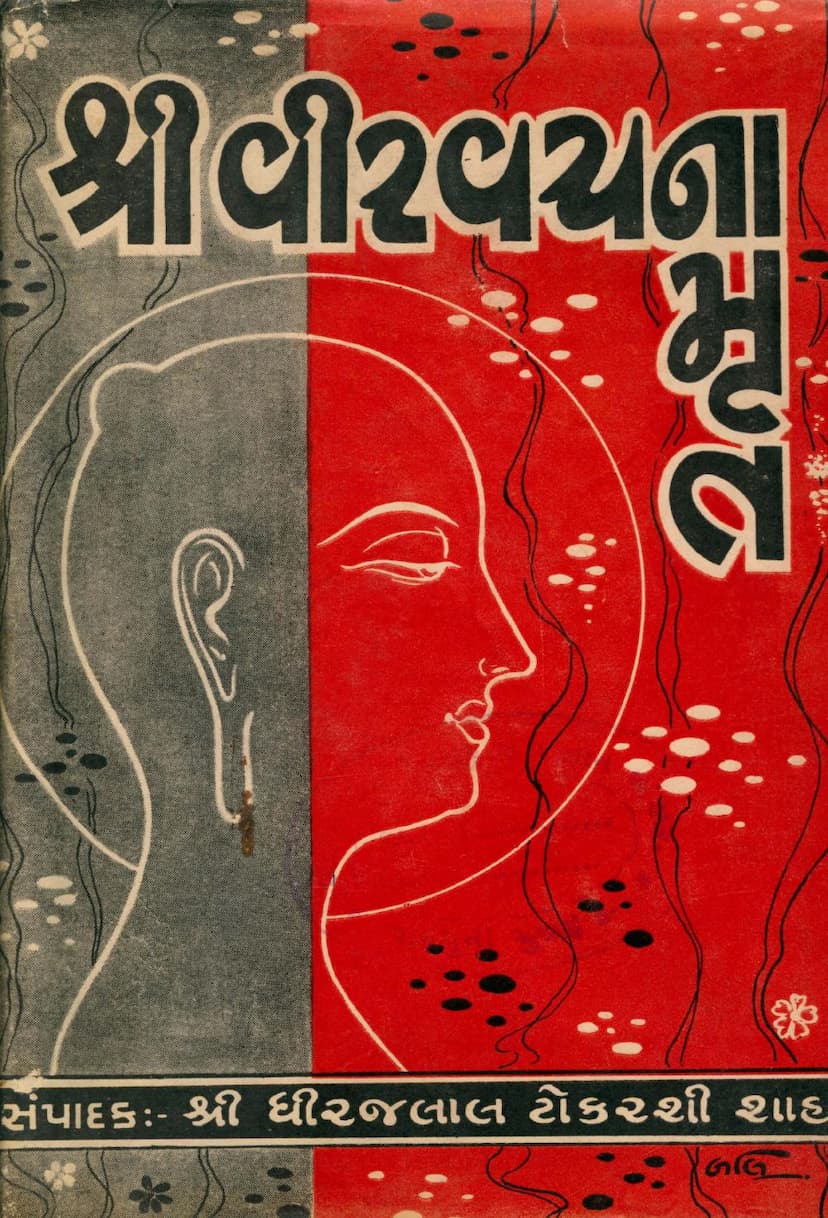Veer Vachanamrut
Added to library: September 2, 2025

Summary
Here's a comprehensive summary of the Jain text "Veer Vachanamrut":
Book Title: Veer Vachanamrut Author: Dhirajlal Tokarshi Shah Publisher: Jain Sahitya Prakashan Mandir Catalog Link: https://jainqq.org/explore/022916/1
Overall Purpose and Content:
"Veer Vachanamrut" is a collection of the teachings of Lord Mahavir, compiled and presented by Dhirajlal Tokarshi Shah. The title itself, meaning "The Nectar of Lord Veer's Words," signifies the profound and life-giving nature of the content. The book aims to disseminate the essence of Lord Mahavir's spiritual wisdom, covering various aspects of Jain philosophy, ethics, and practice. It is structured into numerous "Dhara" or sections, each focusing on a specific topic.
Key Sections and Themes:
The book is extensive, covering a wide range of topics, as indicated by the table of contents (Dhara). Some of the prominent themes include:
- Introduction and Dedication: The book begins with salutations and dedications, expressing deep reverence for Lord Mahavir.
- Lord Mahavir's Life and Teachings:
- Historical Outline: It provides a historical perspective on Lord Mahavir's life, including his birth, parents, names, childhood, and renunciation.
- Spiritual Journey: The text details his rigorous spiritual practices, penances, meditation, and the ultimate attainment of Kevala-jnana (omniscience).
- Key Principles: It elaborates on core Jain principles such as Ahimsa (non-violence), Satya (truth), Asteya (non-stealing), Brahmacharya (celibacy), and Aparigraha (non-possession).
- The Sangh and Dharma: The establishment of the fourfold Jain community (monks, nuns, laymen, and laywomen) and the propagation of the fourfold dharma (charity, ethical conduct, penance, and meditation/spirituality) are discussed.
- Philosophical Concepts: The book delves into fundamental Jain philosophical concepts like the nature of souls (Jivas), the universe (Lok), Karma theory, and the ultimate goal of Moksha (liberation).
- Ethical Conduct and Spiritual Practices:
- Sadhu Dharma: A significant portion is dedicated to the conduct and lifestyle of monks, emphasizing their adherence to vows, austerity, and detachment.
- Vows (Mahavratas and Anuvratas): The text likely discusses the ethical precepts that guide the lives of ascetics and lay followers.
- Austerities (Tapas): The importance and types of penances undertaken for spiritual purification are highlighted.
- Vinaya (Respect and Discipline): The significance of humility, respect for elders and gurus, and disciplined behavior is emphasized.
- The Nature of Reality:
- The Universe (Vishva Tattva): It explains the Jain understanding of the cosmos, including the concept of soul and non-soul substances.
- Soul (Jiva): The nature of embodied souls in the cycle of birth and death and the liberated souls (Siddhas) is described.
- Karma Theory: The intricate workings of karma, its types, and how it binds and liberates the soul are expounded.
- Specific Teachings: The collection likely includes discourses and aphorisms covering various ethical and spiritual topics, such as:
- The importance of living a simple life.
- The concept of friendship and universal brotherhood.
- The significance of Anekan tavada (the doctrine of manifold aspects) and Syadvada (the doctrine of conditional predication).
- The cultivation of virtues like Maitri (friendship), Pramod (joy in others' virtues), Karuna (compassion), and Madhyastha (equanimity).
- The path to liberation through the "Ratnatrayi" (three jewels: Right Faith, Right Knowledge, Right Conduct).
- Praise and Testimonials: The book includes tributes and messages from prominent figures, including the President of India, Governors, religious leaders, and scholars, underscoring the value and impact of Lord Mahavir's teachings.
Key Concepts Highlighted:
- Ahimsa (Non-violence): Presented as the paramount principle, encompassing non-violence in thought, word, and deed towards all living beings.
- Soul (Jiva): The eternal, conscious, and sentient entity, currently bound by karma but capable of liberation.
- Karma: The law of action and reaction, where every deed has a consequence that influences the soul's journey through rebirth.
- Moksha (Liberation): The ultimate goal of Jainism, a state of eternal peace, bliss, and freedom from the cycle of birth and death, achieved through spiritual purification.
- Asceticism and Penance: The rigorous practices undertaken by monks and nuns to shed karma and attain spiritual perfection.
- Equanimity: The balanced state of mind in the face of worldly dualities like pleasure and pain, gain and loss, praise and blame.
Significance of the Compilation:
The compiler, Dhirajlal Tokarshi Shah, is recognized as a "Sakalya-Varidhi" and "Shatavadhaani," indicating his profound knowledge and remarkable memory. His effort in collecting and presenting these teachings in a systematic manner aims to make Lord Mahavir's profound wisdom accessible to a wider audience. The inclusion of testimonials from respected personalities highlights the book's contribution to Jain literature and spiritual understanding.
In essence, "Veer Vachanamrut" serves as a comprehensive guide to understanding and practicing the core tenets of Jainism as taught by Lord Mahavir, emphasizing spiritual discipline, ethical living, and the pursuit of liberation.